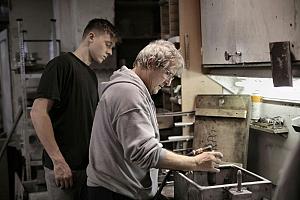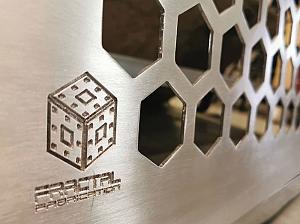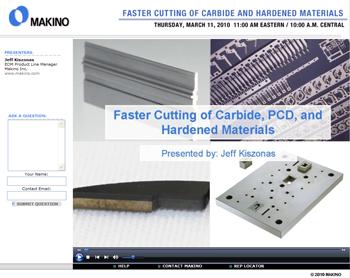- FMA
- The Fabricator
- FABTECH
- Canadian Metalworking
Education Anywhere, Anytime
Web-based seminars are another education tool that today’s manufacturers can use to increase the knowledge base of shop employees
- August 1, 2010
- Article
- Automation and Software
The live streaming of video didn’t exactly start with a bang; it was more like a gurgle and a splash.
Ever since 1991 when the computer whizzes at Cambridge University first started broadcasting video over the Internet by showing live images of their coffee pot, people have been trying to make this technology useful. And finally, thanks to today’s personal computers and the widespread adoption of high-speed Internet technology, we have a use for this in manufacturing.
Web-based seminars, or Webinars, are ideal introducing of new technology and best-practice scenarios for existing equipment.
In 2005 machine tool supplier Makino began creating and showing Webinars live across the Internet to not only help promote its line of machine tools, but also teach application-based lessons.
“Back then it was our goal to convey both the usefulness of our innovative technologies and also be able to give application-specific seminars to our customer base, with a new methodology, in this case, the online seminar,” explained Makino Marketing Manager Mark Rentschler.
Since then Makino has produced more than 100 online seminars on a variety of topics, such as EDM techniques, micromachining, and aerospace production.
Part of the success of the Webinars may be that it has become more difficult for companies to justify travel expenses for offsite educational seminars in a downturned economy. Also, the fact that people can learn on their own time and at their own pace from any computer widens the customer base for such seminars.
“Our objective is to bring new technologies, insights, machining examples, and application-driven knowledge to our customer and prospect base,” said Rentschler. “Our customers are able to watch a 30-minute online broadcast that can have a positive impact in their efficiency, profitability, and tool life. I think everybody involved with manufacturing today knows how competitive the world has become and that anything that can be done to enhance their competitiveness is beneficial.”
Clearly, this type of communication is a great way to introduce technologies, but it is the actual teaching moments that can have the most lasting effect.
“Hopefully we can introduce a manufacturer to a new cutting strategy or a new EDM technique that can have a positive benefit on their business,” said Rentschler.
While most of Makino’s Webinars are geared to manufacturing engineers, programmers, and shop personnel, the company has also produced business-related sessions that are intended for business owners and plant managers.
By archiving each Webinar, Makino ensures that those too busy to attend can still participate at a later time.
“The archive also allows customers that may have been interrupted while participating in the live Webinar go back and pick up where they left off,” said Rentschler.
It also lets people share the Internet link with others who might be interested.
“Our broadcasts are typically at 11 a.m. Eastern Time on multiple Thursdays in a month, and they are generally archived within 24 to 48 hours,” added Rentschler.
During the live event viewers can type a question into a dialogue box and the expert presenter will answer it at the end of the Webinar, during the question period. If a viewer is watching an archived version, however, the question is delivered to the presenter by e-mail.
While this online experience can help distribute information to many people over the Internet, it is not necessarily a total replacement for traditional training.
“I still think Makino excels when we are in a face-to-face environment, but there is no doubting how useful online technologies can be as a supplement to that,” said Rentschler. “People still want to be by the machine. For example, our customers want to see how the machine is producing a chatter-free cut at high speed and see the part come off. With a Webinar that dynamic is sacrificed; however, people are definitely interested in these new tools.”
Solving Fabricating Problems
Jim Warren, director of education for the Fabricators & Manufacturers Association, Canadian Industrial Machinery’s parent company, agrees with Rentschler.
“We have seen the hunger for information grow over the past few years,” said Warren. “Obviously, we would like to see more people take advantage of these sessions, but we are seeing that people are more comfortable using this technology now even compared to just a few years ago. We create online educational events that we call FabCasts to help educate today’s fabricators. We also help our customers get their specific information out to an audience in an online environment.”
The FMA selects speakers who are experts in their fields. Interaction with these experts can be over the phone during the broadcast, or participants can type a question to be answered.
No matter how this type of event is delivered, more and more manufacturers are taking advantage of their usefulness.
Plasma-cutting Webinar
Hypertherm, a manufacturer of plasma cutting technology, recently made available on its Web site two new educational Webinars designed to help companies better understand plasma cutting technology.
These Webinars provide information on the history of plasma cutting and on the latest innovations in plasma hole cutting, giving viewers the information they need to help improve their operations.
The first Webinar chronicles plasma’s past, present, and future. Hypertherm’s Aaron Brandt, part of the engineering team behind HyPerformance plasma, begins by showing viewers how far plasma has come since its discovery in the 1950s, then discusses today’s technologies, and finally gives viewers a glimpse at what tomorrow’s plasma systems will look like.
Brandt’s presentation also covers different plasma cutting methods and applications, explains how to achieve superior cut quality with minimal dross, and shows how the latest technologies ensure cuts are consistent from the first to the last.
The second Webinar is product-specific and explains Hypertherm’s True Hole technology, a new, patent-pending process that the company says significantly improves the quality of holes cut with plasma.
For more information, visit www.makino.com, www.hypertherm.com, and www.fmanet.org.
subscribe now


Keep up to date with the latest news, events, and technology for all things metal from our pair of monthly magazines written specifically for Canadian manufacturers!
Start Your Free Subscription- Trending Articles
- Industry Events
MME Winnipeg
- April 30, 2024
- Winnipeg, ON Canada
CTMA Economic Uncertainty: Helping You Navigate Windsor Seminar
- April 30, 2024
- Windsor, ON Canada
CTMA Economic Uncertainty: Helping You Navigate Kitchener Seminar
- May 2, 2024
- Kitchener, ON Canada
Automate 2024
- May 6 - 9, 2024
- Chicago, IL
ANCA Open House
- May 7 - 8, 2024
- Wixom, MI















